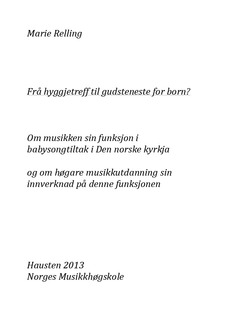| dc.description.abstract | Abstract. - This survey examines music making for infants with parents (Norwegian: babysong) in the Norwegian church, in the context of music education. The purpose of this survey has been to assess the competence of teachers of babysong in religious education in the Norwegian church. We investigate whether there is a correlation between knowledge background and prioritization of content and values; and we consider the function which music has or may have in the Norwegian church in the teaching of babysong. The theoretical framework is based on music theology and sociology of religion. From the music-‐theological perspective, the emphasis is on the nature of music, aesthetics of music, liturgical aesthetic tradition, listening, the total liturgical experience; and the relationship between the Word, verbal texts and music. The religious-‐sociological focus is on the aestheticisation of religious life, and the consequences of this; particularly for Christian children's song repertoire, which at present is influenced by trends in entertainment and bodily expression. The thesis is based on a questionnaire posed to all leaders of babysong in the Norwegian church. The data consists largely of quantitative material, which, due to question types and formulations, requires hermeneutic interpretation. The results show that babysong leaders have considerable pedagogical training and a certain amount of musical and/or theological training. Activities intended for enjoyment – both musical and social – dominate babysong. Music is highly emphasized by all; somewhat more so by respondents with 5-‐6 years of musical training, but the differences between this group and the rest are smaller than expected. The function of music is to create joy and to disseminate the Christian faith. The author will give a qualitative discussion of the theory and empirical evidence in favor of increased competence in the area of music; specifically, greater awareness of the inherent potential of music to convey existential meaning. Advanced musical training does not necessarily give such awareness. Put starkly, the consequence will be that one moves from a meeting where music is primarily seen as means of enjoyment to a celebration of babysong meetings as church services for children,
where enjoyment, religious education and profound aesthetic experiences may coexist freely. | nb_NO |
